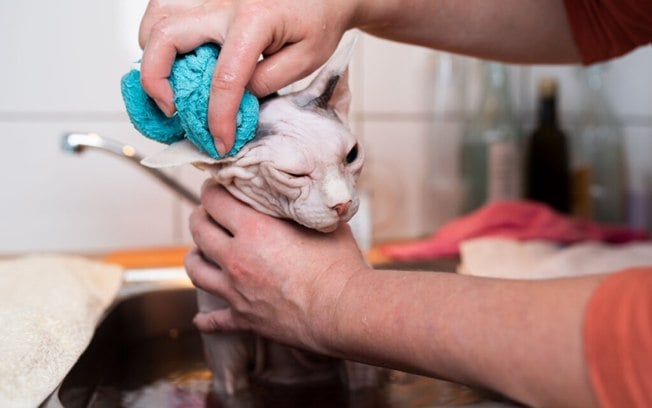The sphynx cat is a true jewel of nature, known for its unique and charming appearance. The first hairless cat was born naturally in Canada in 1966. Because of this, breeders tried to reproduce more often, but it wasn’t an easy process, as the animals were born with genetic and health problems. It was only later, in the 1970s, that they were successful with the first sphynx kittens. It is even believed that the Devon Rex cat was part of the cross-breeding.
Follow some interesting characteristics of the sphynx cat!
1. Physical aspects
According to information from the Cat Fanciers Association (CFA), the sphynx is not always completely hairless. This is because there may be fine, velvety fluff on the body, providing a soft feel to the touch. Some short hairs are usually present on the nose, ears and sometimes on the toes and tail of the feline.
With wrinkled skin and a slightly pink body, the hue can vary. As well as black and white, you can find sphynx with spots and unique colors. Their size varies from medium to large, with a muscular body and an average weight of between 3.5 kg and 7 kg. Adult males tend to be larger than females.
2. Temperament and personality
In addition to its peculiar appearance, the sphynx is notable for its temperament and sociability. They love attention from their guardians and are known to follow people around the house, seeking constant interaction. He can even be clumsy in his attempt to attract attention and usually likes to be held.
Despite preferring the company of humans, according to the CFA, this breed also tends to live in harmony with dogs and other cats. In addition, they can be very attached to a family member and even become jealous of that person.
3. Food and health care
Despite their lack of hair, these cats need special skin care, such as regular baths to remove oil buildup. The absence of hair also requires extra precautions in relation to sun exposure, as they can be more prone to burns.
As for feeding, it is essential to provide a balanced diet, paying attention to the specific needs of sphynx. They are prone to gaining weight, so controlling the amount they eat is crucial to maintaining a healthy physical condition. In addition, offering a rich variety of wet and dry foods can meet their nutritional needs.
4. Education and socialization
In terms of education, sphynx are highly intelligent and respond well to positive training. Playful by nature, mental stimulation is crucial to keeping them entertained.
These cats also adapt well to apartment life and live harmoniously with other pets. In addition, socialization from the time they are kittens is fundamental to developing friendly and confident behaviour.
